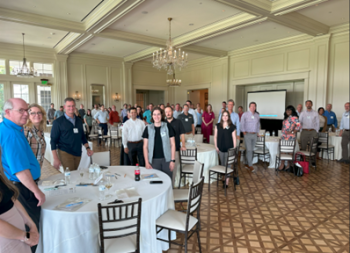Supreme Court Limits Compensability of Weight Loss Treatment Recommended for Injured Employees
On Friday March 22, 2024, the Supreme Court issued a favorable decision for the defense in Kluttz-Ellison v. Noah’s Playloft Preschool, No. 173PA22 (N.C. 2024). Lindsay Wikle and Duane Jones from Hedrick Gardner represented Defendants. The Supreme Court provided a test to determine whether requested medical treatment is “directly related” to the original compensable injury, setting further limitation on the compensability of additional medical treatment recommended by treating physicians. The case discusses medical treatment that is not directly related to the work injury (gastric bypass surgery), but is necessary to be performed in order for related medical treatment (knee surgery) to occur.
In Kluttz-Ellison, the employee sustained a compensable knee injury, but in order to have the medically necessary knee replacement surgery, she was required to undergo bariatric surgery. The employee’s obesity pre-existed the injury, and there was no evidence that the knee injury exacerbated or caused her obesity or any post injury weight gain.
The Full Commission ordered the treatment to be paid by Defendants concluding it was necessary treatment for the compensable injury. The Court of Appeals affirmed the Full Commission’s determination.
The Supreme Court reversed the Court of Appeals, and articulated a definitive test going forward to apply to an employee’s requested medical treatment.
The Supreme Court emphasized the importance of the “direct causal relationship” in the context of the Workers Compensation Act. With that background, the Supreme Court set out three instances where medical treatment requested by an employee can be deemed to be compensable medical treatment to be paid by the employer.
- First, a causal relationship exists where the workplace injury directly caused the condition for which treatment is sought; therefore, the medical treatment is to be paid by the employer.
- Second, a causal relationship exists where the workplace injury materially impacts the condition for which treatment is sought by aggravating that condition or causing new symptoms; therefore, the medical treatment is to be paid by the employer.
- Third, a causal relationship exists if the condition was materially accelerated by the workplace injury, meaning the condition did not require medical treatment or intervention of any kind before the workplace injury but now requires treatment to aid in the treatment of the workplace injury. Therefore, in this situation, the medical treatment is to be paid by the employer.
If any of these three conditions are met, the requested medical treatment is directly related to the work injury. If none of the conditions are met, at most, the treatment is indirectly related to the work injury and is not compensable under the Act.
This case allows a defense to providing treatment in accepted workers’ compensation claims where additional medical treatment is recommended or needed, but not caused, aggravated, or materially impacted by the original compensable injury. The most applicable regularly encountered situations include weight loss treatments, blood pressure control appointments, and smoking cessation programs. Of course, as discussed in the Opinion, there are several more complex and more costly scenarios that can occur. The Supreme Court has now given a clear test to evaluate these scenarios.
For informational purposes only. Prior results do not guarantee a similar outcome.




